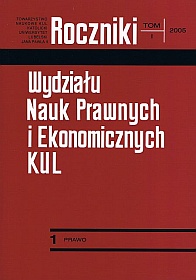On the Problems of Legal Capacity and the Natural Person's Capacity for Legal Acts in the Russian Civil Law Code
Abstract
The principles of equality in civil law relations as stated in the article 1, section 1 of the civil law code in Russia and the principality of autonomy of the will of both sides formulated in the article 1, section 2, point 1 the civil law code of the Russian Federation are the bases for civil law subjects to profit from authorization which is vested to them. However, in order to accomplish them efficiently natural person should be equipped with a certain potential, which to great extent depends on the will of a legislator. The potential is described by the terms legal capacity and capacity for legal acts. Any ability is an inborn gift, talent which gives a human being specified powers. The legal capacity should be understood as an innate possibility of a human being to be a subject of law which exludes crediting with normative character. It is groundless to reduce the legal capacity to the category of subject law as well as admitting the possibility of setting limits. Such limits in reality may be applied to only a definite law.
The capacity for legal acts in the view of a legislator, is the ability of a citizen to achieve and carry into effect his civil laws, both creating and executing his duties. Contrary to legal capacity it is restricted depending on eg. the level of physical, psychical and social maturity. The full capacity for legal acts is gained by people who come of age (eighteen years and older) as well as the people who before that age got married or were emancipated at the age of sixteen as a result of getting employed or conducting economic activity. The justified circumstances for limiting the capacity for legal acts of anybody who acquired the full capacity for legal acts is abusing alcohol, taking drugs which leads to financial difficulties of their families. In order to protect the rights of an individual in case of mental disability, the court is entitled to announce the capacity for legal acts of a given person null and void.
References
Беспалов Ю.: Пределы прав несовершеннолетних эманципированных граждан, „Российская Юстиция” 2001, N0 8.
Rozwadowski W.: Gai Institutiones. Instytucje Gaiusa. Tekst i przekład, Poznań: Przeds. Wydawn. Ars boni et aequi, 2003.
Большой русско-польский словарь, Москва−Варшава: Русский язык, Ведза Повшехна 1986.
Братусь С. Н., Иоффе О. С.: Гражданское право, Москва 1967.
Братусь С. Н: О соотношении гражданской правоспособности и субъективных прав, „Советское государство и право” 1949, N0 8.
Братусь С. Н.: Субъекты гражданского права, Москва 1950.
Вербес Я. Р.: Основные проблемы правосубъектности в советском гражданском и семейном праве, Москва 1994.
Красавчиков О. А.: Юридические факты в советском гражданском праве, Москва 1958.
Крылова З. Г, Гаврилова Э. П.: Российское гражданское право, Москва 2001, 2 изд.
Мейер Д. И.: Руссское гражданское право, ч.1. По исправленному идополненному 8 изд. 1902, Москва 1997.
Мозолин В. П.: Гражданский кодекс Российской Федерации. Часть первая. Научно-практический комментарий, Москва: Издательство БЕК 1996, c. 50.
Мусин В. А.: К вопросу о соотношении гражданской правоспособности и субъективных прав, „Вестник ЛГУ” 1964, N0 17, Выпуск 3.
Римское частное право. Учебник, ред. И. Б. Навицкий, И. С. Петерский, Москва 1994.
Нечаева А. М.: Правоспособность и дееспособность физических лиц как субъектов гражданских прав, w: Субъекты гражданского права, ред. Т. Е. Абова, Москва: Институт государства и права РАН 2000, c. 6.
Ожегов И. Ф. С. И.: Словарь русского языка, Mосква: Русский язык 1988.
Синайский В. И.: Руссское гражданское право, Москва 2002.
Гражданское право. Учебник, т.1, 2 ред. Е. А. Суханов, Москва: Издат. БЕК 1998.
Copyright (c) 2005 Roczniki Wydziału Nauk Prawnych i Ekonomicznych KUL

This work is licensed under a Creative Commons Attribution-NonCommercial-NoDerivatives 4.0 International License.

